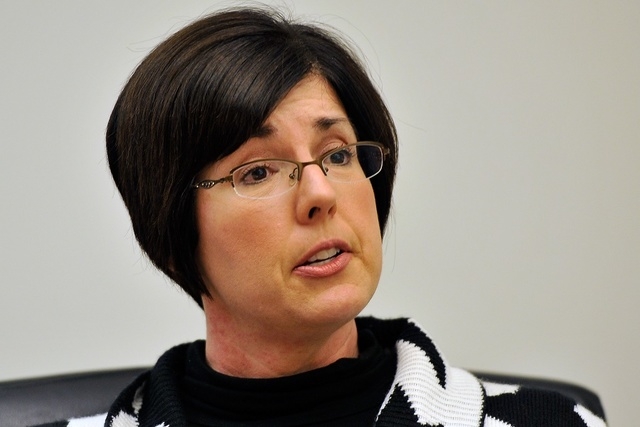County: Media interviews with Family Services workers need director’s approval
Clark County child welfare workers should have the freedom to voice job-related concerns to the news media, contends the union that represents them.
But a Family Services media policy revision enacted by county officials in 2014 means they now have to get permission from the department director first.
The stricter media policy for Clark County Department of Family Services employees was revised and reissued to staff only two days after the group’s union leaders called for workplace improvements last summer. The timing was a coincidence, according to county officials.
However, leaders of Service Employees International Local 1107 — who in August petitioned Clark County commissioners about job safety concerns and more manageable caseloads for social workers — find that difficult to believe.
“Our workers’ willingness to come forward and discuss specific problems put a spotlight on a department that’s long needed reform,” said a recent statement from the SEIU. “The policy governing (Family Services) workers’ ability to communicate with the news media was tightened at precisely the time our members launched their public campaign. It’s hard to believe the timing of these new restrictions was coincidental.”
Some of the issues with Family Services have been addressed, but the union continues to work on other concerns with county commissioners, the union said.
The revised media policy requires staff to get approval from the director to provide interviews to the media. The old media policy, dating back more than a decade, was a little broader and it required prior approval from the director or a designated person, before talking to the media. The old policy also allowed for employees to inform the assistant director’s office concerning media inquiries.
The 2014 amendment to the revised policy specifies that it supersedes the old media policy.
Two different versions of the revised policy also show inconsistencies, which county officials attributed to typos. The year the policy was approved and the number of amendments made to the policy differ from version to version.
No connection “whatsoever” exists between the union activity and the timing of the media policy revision, said Clark County Assistant Manager Jeff Wells.
In January 2014, Family Services Director Lisa Ruiz-Lee asked for all administrative policies to be updated, reviewed and eliminated if no longer necessary, Wells explained.
“It was a simple review of administrative policies rolled out in a package,” Wells said.
STRICTER GUIDELINES EVOLVE
On July 9, 2014, county management met with union officials to discuss their workplace concerns. A second meeting took place on July 24, 2014, the same day Family Services’ media policy revisions were approved.
The petition calling for improvements in the child welfare system was presented to Clark County commissioners on Aug. 5, 2014. The revised policy went to staff two days later and changes went into effect Aug. 12, 2014, according to records.
The policy states it exists “to assure information disclosed to the media by DFS is timely, accurate, comprehensive, authoritative and relevant to all aspects of the department.”
“If staff contact with media is approved by the director, the media relations designee must prepare staff for media interviews as needed,” the policy reads.
The union maintains that workers should be able to speak to news media if they choose to do so.
“More broadly, as the labor union representing DFS workers and more than 8,600 other public workers throughout Clark County, we value the role the news media plays in scrutinizing government operations,” the SEIU statement said. “We generally do not think gag policies serve taxpayers, the public or our communities.”
The county’s general news media policy is more relaxed and encourages employees to respond to the media promptly and accurately.
“Our basic county policy basically encourages staff, if they know answers to basic questions, to go ahead and respond to them,” Wells said during a Feb. 19 editorial board meeting with the Review-Journal.
Wells said he wasn’t sure if he would characterize Family Services’ media policy as stricter than the county’s general media policy, but said that Family Services has the additional burden of complying with state and federal confidentiality laws.
“You can talk to parks people or (Real Property Management) about how long it is going to take to replace a window and there’s very little damage if they get it wrong. (There) can be damage done if we get it wrong over here,” he said of Family Services.
But Family Services employees are trained on what’s confidential information, Wells added.
“I know they are well trained on it,” he said. “I hope that they know the difference.”
Still, any employee who violates any policy is subject to progressive discipline that could lead to termination, Wells said during the editorial board meeting.
Wells later said not every employee has complete access or knowledge of everything that is going on in all the case files, so he believes it makes sense to try to coordinate answers to the media.
VARIATIONS IN POLICY COPIES
When the Review-Journal made a public records request for the Family Services’ revised media policy in early September, the version it received listed 2003 for the approval date and shows one amendment — that the 2014 change supersedes the DFS media policy enacted in 2003.
The Review-Journal obtained two additional copies of the policy update from two different sources. Those versions list 2013 as the approval date and refer to two amendments. The main body of the policy in the various copies are the same.
The correct version is the one with the 2003 approval date and one amendment, Wells said, adding the variations are clearly typos.
He had “absolutely no idea why one says one (amendment) and one says two (amendments).”
“Whether it makes a huge difference on whether or not they did a typo or whether there was one or two amendments, I can’t tell you,” Wells said.
Contact Yesenia Amaro at yamaro@reviewjournal.com or 702-383-0440. Find her on Twitter: @YeseniaAmaro.

















